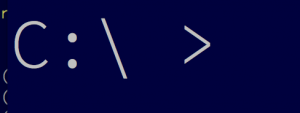I grew up with computers. We got our first machine, an Atari 800, when I was only 8 or 9. An 8-bitter with hardware sprites. 48 KiB of memory, and a cassette tape trive, this was only one step removed from the Atari 2600 game console. Very nearly useless, this was a machine for enthusiasts and hobbyists.
Over time, computers became less useless, as well as more “user-friendly,” but they — particularly the PC style machines — kept the doors open to hobbyists and tinkerers.
The Bad News
I think, however, that that era has come to an end, and I’m saddened. I see three basic trends that have killed it.
 The first is that the network-connected world is dangerous. You can’t just fire up any old executable you find on the Internet in order to see what it does. It might do something Awful.
The first is that the network-connected world is dangerous. You can’t just fire up any old executable you find on the Internet in order to see what it does. It might do something Awful.
The second is that the closed ecosystem app stores of the world, aiming for a super smooth experience, have raised the quality bar for participation — particularly for “polish.” You simply cannot publish ugly, but highly functional software today.
The third problem is that you can’t make interesting software today without interacting with several systems in the cloud. Your app, hosted on a server, talks to a database, another app, and a half dozen other APIs: a link shortener, a video encoder, etc. And these APIs change constantly. There is no commitment to backward compatibility — something that was an iron-clad requirement of the PC era.
Trend one is a painful fact of life. Trend two could be reversed if the manufacturers had any incentive to do so. They do not. Trend three, I think is the worse, because it is wholly unnecessary. Say what you want about the “Wintel duopoly,” but they did not punish developers like modern companies do.
Together, these things pretty much lock out the casual developer. I’ve learned this the hard way as I try to push forward in my free time with a few open-source apps in a post PC world. It is one thing for a paid programmer to maintain a piece of software and deal, however grudgingly, with every email that comes from Google telling you that you need to update your code, again. But the hobbyist who wrote something cool for his friends, that worked for six months and then broke, is kind of stuck. Does he want to run a zero-revenue company that “supports” his app in perpetuity?
This makes me sad, because I wonder what we’re missing. As many of your know, I have gotten into ham radio. There’s a lot of cool ham-authored software out there. It’s ugly. It’s clunky. But some of it does amazing things, like implement modems that forward-error-correct a message and then put it into a ridiculously narrow signal that can reach around the world. Today, that software still runs on Windows, usually coded against the old Win32 or even Win16 libraries. It gets passed around in zip files and people run unsigned executables without installers. It’s the last hacky platform standing, but not for long.
The Good News
Of course, if the PC, Mac, i-device, and household gadget becomes more and more locked off, there is an exciting antidote: Arduino, Raspberry Pi, Beaglebone, and the entire maker world. People are building cool stuff. It’s cheap, it’s fun, and the barriers to entry, though intellectually a bit higher than the “PC” are pretty damn low. Furthermore, the ecosystems around these products are refreshingly chaotic and more than slightly anti-corporate.
One of the nice things about this platforms is that they are self-contained and so pose little threat to data other than what you put on them. On the other hand, they are full-fledged computer and are as exploitable as any other.
If you make something cool that runs on a Raspberry Pi, there’s still pretty little chance every kid at school will soon have it and run it, but then again, maybe there never was.